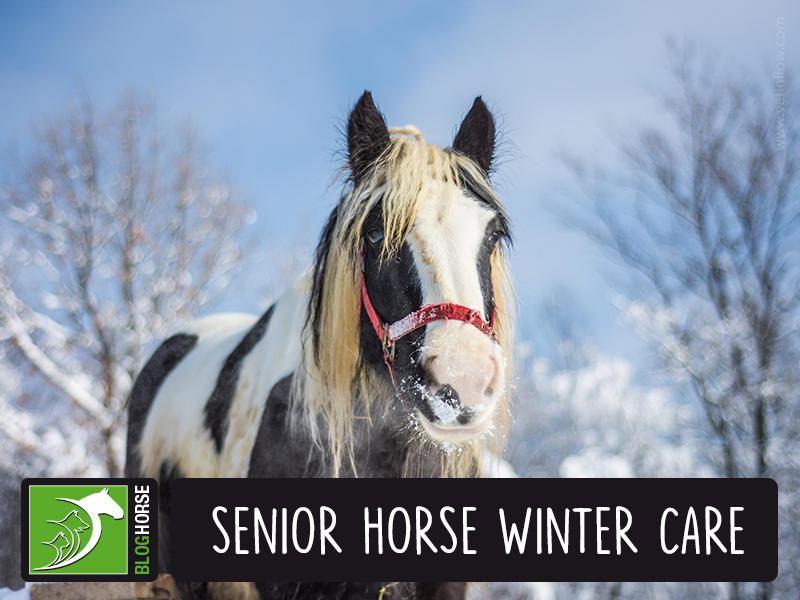
Senior Horse Winter Care

With Winter fast approaching and the temperatures dropping, we feel this is the perfect time to remind all horse owners of the special precautions they need to be aware of during this cold season, this time with a particular emphasis on the older horse.
Horses are sturdy animals that cope really well in cold temperatures the real enemies during this season are the wind and the rain! However, there are some basic things you need to do to keep your horses protected, such as:
- Access to a waterproof and windproof shelter where your horses can seek protection from the elements.
- Access to fresh, unfrozen water at all times.
Water consumption in Winter is usually decreased in all species, but this is particularly dangerous for horses as it can lead to impaction colic or other gastrointestinal problems.
- Maintain an appropriate exercise routine.
Sometimes temperatures will drop to negative numbers, and no one really wants to go riding when it's raining or snowing outside. However, exercise should be an integral part of a horse's daily life as it helps maintain their physical health and keeps them mentally stimulated.
Just be extra careful riding in Winter, as it is more likely your horses can slip and fall.
They can also easily get chilled after a workout, so it is a good idea to spend some time walking your horses after exercise to allow them to cool down gradually.
- Pay particular attention to the hooves.
Besides regular maintenance, it's also very important to check your horses' hooves daily for snowballs, moisture and mud as these can cause foot problems such as flares, bruises and abscesses.
Consult with your farrier to decide if it's best to keep your horse shod or barefoot during this season.
If your horse is on his or her golden years, there are some things you should consider more carefully to prepare for the cold season.
#1: Nutrition
Thoroughly assess and meet your horses' nutritional needs: as a horse owner, you know how difficult it is to find the right nutritional balance to feed your horse and during Winter is no exception.
Calories that are not immediately converted to energy and used for physiological functions will be stored as fat, which helps to insulate the horse against the cold. In wild horses, fat reserves usually build up during Summer when forage is abundant, and they will naturally be consumed over Winter when food is sparse. This weight fluctuation is normal if within reasonable limits.
However, the modern horse lifestyle usually doesn't compare to the wild horses'. Their life is not as harsh, and weather conditions are not as extreme if there is an appropriate shelter. Knowing this, alterations to your horse's diet should be done accordingly.
Some horses, depending on their body condition score (BCS), will benefit from increased caloric intake to help them maintain their body temperature, as the digestive process is an excellent source of body heat. Pastures will also not be as available, and this will need to be compensated. To ensure your horses' BCS stays at a healthy level and that they can fend off the cold, it's a good idea to keep forage accessible at all times.
However, you should try to keep your horses' weight stable as overweight horses are susceptible to laminitis, and other health problems. Make the necessary adjustments to your horses' diet considering how much they are eating as well as what factors might be increasing or decreasing their needs.
Also, keep in mind that older horses aren't able to digest food as efficiently as younger horses and a proper nutritional balance can be tricky to achieve.
#2: Rugs
Putting a rug on your horses should be carefully considered. On the one hand, it can provide extra warmth to keep them comfortable but on the other hand, horses' have their own physiological, anatomical and behavioural mechanisms that regulate their body temperature which we might not want to interfere with.
Senior horses tend to have less muscle mass and fat to act as insulation and can have concurrent diseases that will hinder them from coping with the cold so they might benefit from this extra protection.
There are different types of rugs you can use on your horse, from simple rain sheets to heavier, warmer blankets. You should choose one that meets your horses' needs and keep in mind that these may vary according to their environment and activities.
Don't forget to check if it's fitted correctly and inspect it daily so your horses don't have wet or poorly fitting rugs on them. If you spot any issues, change the rug as soon as possible.
#3: Health check
If you have an older horse, you're probably already familiar with all these extra precautions that we're covering!
However, each horse has different requirements, and it's always advisable to talk to your vet when preparing for the cold season. They can tell you what factors and issues might be influencing your horses' capacity to deal with the cold and advise you on how to best prepare.
We hope you find this helpful, if you'd like to know more about caring for the older horse we can help!
Would you like to know more about horses? Check our Equine Courses:
Equine courses
Published: 07 Dec 2018
Read the previous article: Basic care for kittens - part II

